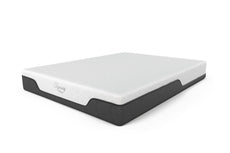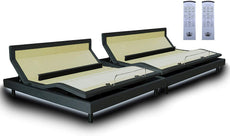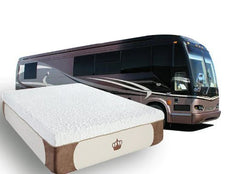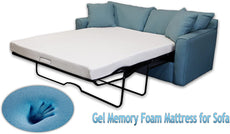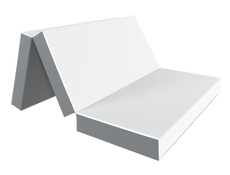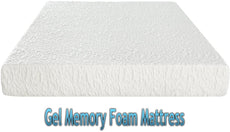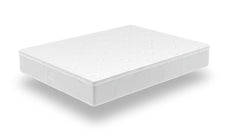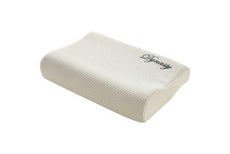
rv mattress collection blog
Read This Before Purchasing an RV Mattress
Read This Before Purchasing an RV Mattress
Recreational vehicles aren't necessarily known for their mattresses. After all, the mattress is commonly an afterthought, hastily added in after everything, including the kitchen sink. Worse yet, if you purchased a used RV, that mattress could have significant wear and tear, in addition to various sagging and lumps that can make it hard to get a good night's rest.
Even if you purchased your RV new, the included mattress can leave a lot to be desired, regardless of if you sprung for the top of the line RV. You may have forked over a small fortune for the ability to pick up and leave at a moment's notice, but that doesn't mean that the included RV mattress is anything close to what you're used to sleeping on at home.
Can You Get By With Your Existing RV Mattress?
Before you consider replacing that old RV mattress, it makes sense to consider whether you really need a new one. While more modern memory foam mattresses are more affordable and comfortable than ever, your existing mattress may be serviceable if you opt for a memory foam topper instead of a new mattress.
If you rarely use your RV's bed, electing to camp outside or to stay in a guest room whenever you visit friends and family, you may not need to do anything to that uncomfortable bed. But for most, you'll need to do something about that bed so that your next time out doesn't also mean an uncomfortable night on that subpar RV mattress.
Shopping For a Memory Foam Mattress RV Bed
While shopping for a memory foam RV mattress isn't necessarily complicated, it's important to consider all your needs. A thin memory foam mattress or a topper may be intriguing, but if you're truly uncomfortable on your existing foam mattress, a thin memory foam replacement may not do the trick.
Ideally, you'll want a mattress that's at least 10" or 12" inches thick so that it can support your weight and provide comfort throughout the night. You won't be able to go with a thick mattress if you're working with a floating platform or bunk bed, but for that mattress in the back, memory foam is a great fit as long as you have the space for it. Not to mention that a memory foam mattress is lighter than a comparable coil mattress, which helps optimize your fuel efficiency as well as your comfort.
Once you get the sizing right, it's time to order. Leave yourself a few weeks for delivery and some extra time to try it out and send it back if it's not what you had in mind. If you'd like to see how you'd respond to a memory foam RV mattress, you can also try getting a memory foam topper to determine how it changes your comfort level. It won't give you the full benefits of a memory foam mattress, but it can show you how memory foam dials up the comfort even on top of uncomfortable platforms and foam beds.
For many, a memory foam mattress is the ideal RV mattress. It's light, affordable, comfortable and gives you a plusher, more supportive feel than other types of mattresses. If you're looking for a new mattress for your RV, we've got various options for you right here at Dynasty Mattress. Shop our RV mattresses to get started.
What Size RV Mattress Do You Need?
Just like conventional mattresses, RV mattresses come in different sizes, such as twin, full, king and queen mattresses. A twin mattress measures 39" by 75", while a full is wider at 54". A queen mattress comes in three sizes: 60" by 80", 48" by 75" and 60" by 75", while a king mattress is 72" by 80". Other mattress sizes are known as "truck" mattresses or irregular RV mattresses, which may have certain cutouts or other irregular shapes.
If your RV mattress is a regular size, you're in luck, Just purchase a new memory foam RV mattress, swap out the old mattress and be on your way. If your RV mattress is an irregular size, you may need to order a custom mattress -- or you can always get the closest regular sized mattress and do the trimming yourself with an electric carving knife (foam mattress only). Once you zip up the exterior and put the sheets on, you'll never know the difference.
Types of RV Mattresses
When shopping for a new RV mattress, it's important to know what to look for. What might work at home may not be what you'll want on the road, not to mention that there may not be space for a thick and plush mattress if you have low ceilings or other concerns. That said, while most RVs come with thin and uncomfortable mattresses, you can gain a lot of comfort from a plush mattress that provides real support.
However, most so-called RV mattresses are made from cheap and uncomfortable foam. Measuring only a few inches in thickness, a foam RV mattress is typically not thick nor dense enough to really support your body weight. That's why when you lay down it feels like you're laying on the structure below, with all the discomfort that comes with it. Better RV foam mattresses may be slightly more supportive, but the actual sleep quality leaves a lot to be desired.
For the utmost in support and comfort, a memory foam RV mattress is ideal, and it strikes the perfect balance between cost and comfort that you can't really get with any other type of mattress. Traditional coil-based mattresses are expensive and monumentally heavy, and odds are you won't be able to get one into your RV, much less on the platform where it needs to be.
The best part is that memory foam RV mattresses are thicker and more comfortable than regular foam mattresses, and newer memory foam models have helpful gel cooling built right in that can help you get a good night's rest when the temperature warms up. Sometimes an RV memory foam mattresses may utilize foam in the under portion to help support the weight up top, but the memory foam itself is concentrated where you'll feel it most -- under your body.
In fact, memory foam mattresses can be so comfortable that many buyers end up preferring their RV mattress to their home mattress, or they end up having to replace their mattress at home to match the sleep quality they get in their RV.
0 comments
